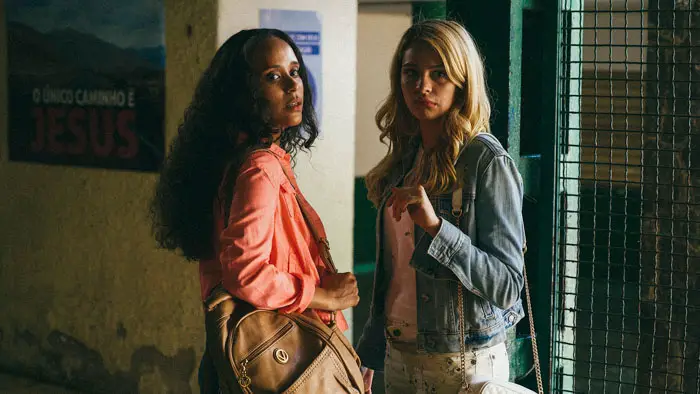
What is it like making an independent production in Brazil? Were there any problems? Did it go smoothly?
It was financed before Bolsonaro was elected, and we were able to shoot it before the pandemic in November of 2019. It is a low-budget film, even for Brazil. The cost, including post-production, is less than half a million dollars. We shot it in 28 days in Brazil. We didn’t have much money, so we shot the film really fast. But everything went smoothly, as we prepared a lot and rehearsed a lot. It is how we do films. I personally don’t like shooting that fast, but that is how it was possible to do the film.
Well, the results are amazing. I would never have guessed the budget was that low from how good the lighting was.
Even for Brazil, it is a very low-budget film. I don’t know how we managed to do it.

“I like mixing different genres in my films, from horror to the fantastic to the musical to the humor.”
Wow. It looks spectacular. How did you get into filmmaking? When did you decide you wanted to be a filmmaker?
It took some time for me. I didn’t go to school for film originally. In Brazil, you have to decide your career path before you attend University, not afterwards. I was 17, and I went to college for self-communication, which is a somewhat vague degree here. I later decided to major in cinema. I grew up with a mother, a math teacher, and a cinephile. I grew up with her taking me to the cinema a lot as well as many trips to the VHS store. But in college, it was an important point for me to find a steady job. Both my parents are teachers, and no one works in the arts. So I was interested in cinema, but as a scriptwriter or editor for television, I saw myself as a freelancer. But when I did a short film at the end of college, it ended up in some festivals. I got many prizes for it, so I made another film. I never saw myself directing films and ended up in it almost by accident. It wasn’t something I planned from a young age. I wanted to work in the business, but I became a director because I wanted to have fun with my friends. That short was called The Noon Vampire and had a super-nice festival career. Everything went from there.
Which directors personally inspire your work as a film director?
My main inspiration is David Lynch. He’s my favorite director. If I had to pick one film in the world, it is Mulholland Drive that is my biggest inspiration; it is genius. Lynch influenced me a lot in the way he mixes genres in the narrative. I like mixing different genres in my films, from horror to the fantastic to the musical to the humor. I like how it gets surreal and causes you to expect the unexpected. Dario Argento was a big inspiration, especially in Suspiria, in how he used the colors and the framings. Also, the way of not taking yourself too seriously, which I really like about Argento. For Medusa, Lynch and Argento were the main inspirations, but several other filmmakers, like Brian Di Palma, also inspired me. Jean-Pierre Jeunet also in the way he uses horror with social criticism and puts some humor in his films. Also, Harmony Korine for Spring Breakers. I have a lot of inspiration. To construct Medusa‘s aesthetic, I wanted to push the colors. So we watched a lot of movies from the 70s, 80s, and the last few years that pushed color hard. Nowadays, people shoot in a much more flat way and put the colors in post-production. It was essential for me to use the colors on set and commit to a color system from the beginning.
